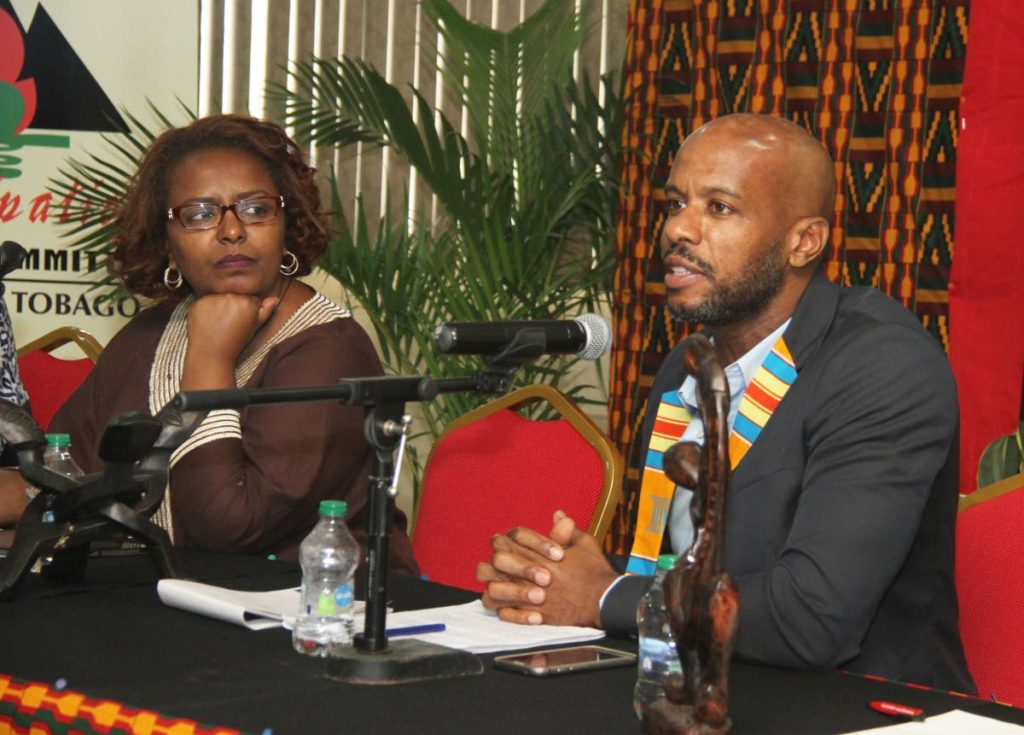There is something wrong with us

SHABAKA KAMBON, son of Emancipation Support Committee (ESC) chairman Khafra Kambon, believes there is something wrong with TT citizens.
Kambon, director of the Cross Rhodes Freedom Project, spoke at the forum on Africa and its Diaspora at the Lidj Yasu Omowale Emancipation Village, Queen’s Park Savannah, Port of Spain, on Tuesday.
He said the majority of society has been alienated from its past.
“We’ve been taught to celebrate the greatest perpetrators of genocide, and the ones who fought for our freedom are nowhere in our language.”
He addressed the 2017 Carnival band launch of Cazabon: The Art of Living by designer Brian Mac Farlane as part of the problem.
"He launched a section called Garçon de la Maison, which means 'house boy,' and La Belle Dame, which means 'the beautiful lady.' This collection was inspired by a period of colonialism which Mac Farlane called 'really the most beautiful time.' But as far as I know, the 1790s was the peak of slavery in TT."
Kambon said he had debated with author Michael Anthony, who, he said, called colonialism "a great acheivement" and something to be grateful for.
"If we can't get people to understand the reality of colonialism, we can't move the society forward."
Kambon said it was a very interesting reality that people would want to revisit colonialism when it fostered inequality, apartheid and separation.
It was horrifying that TT celebrates figures such as the late British prime minister Winston Churchill, who was reportedly responsible for the death of millions of Indians in the 1940s. Kambon said Churchill was quoted as saying he hated Indians and considered them "beastly people with a beastly religion," before asking the audience, "And what do we do? We name a highway after him." Kambon called Port of Spain a monument to colonialism and said he and his organisation have been calling for a public consultation with the mayor,Joel Martinez, for two years, but to no avail.
Also speaking at the forum was Meskerem Geset Techane of Ethiopia, chair of the Working Group on Discrimination Against Women in Law and in Practice of the UN Human Rights Council. Techane spoke about the feminisation of "un-freedom" and the problem of discrimination against women and girls in Africa.
"Boys and girls are not treated as equals in African families. Against girls there is conjugal slavery, sexual slavery, and economic deprivation is a big challenge for women and girls in Africa." Techane told the audience that with the fast-growing economic inequality in Africa, women are part of the population that is being left behind.
Girls are not given the chance to inherit family land, she said, and alhough there are many laws being adopted to international standards, contradictory customary laws regarding marriage, family, land and inheritance are still being operated in parallel.
"Women are the most agricultural workers, but they have so much trouble getting land and property. This perpetuates a life cycle of poverty and marginalisation. They go into marriage with no land or property; when they're in the marriage they have no say over what happens to the land or property; and then, if the marriage ends, they leave with nothing. Sometimes even widows are chased out of their land because, customarily, they have no right to control land and property."
She added that though the parliament in Rwanda is made up of 51 per cent women and Ethiopia's cabinet is made up of 50 per cent women, most of the customary and discriminatory laws are perpetuated by women.
American author Vulindlela Ijiola Wobogo called Shabaka Kambon a young and fiery prophet. Wobogo said he learned about racism through various experiences at school, church and even while using public transport. He said changing the political and economical relationships between people in society and dealing with one's own views on race was imperative in dealing with racism.
The forum was part of the ESC’s Pan African Festival TT: Commemorating Emancipation 2019 event, which is being held from May 26-August 1. The theme of the festival is Pursuing Recognition, Justice and Development.


Comments
"There is something wrong with us"